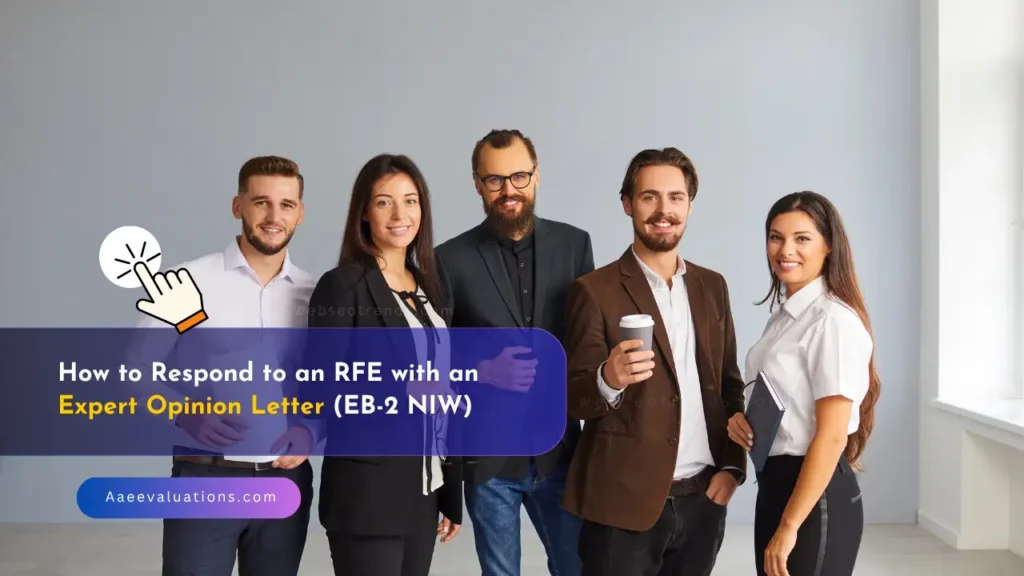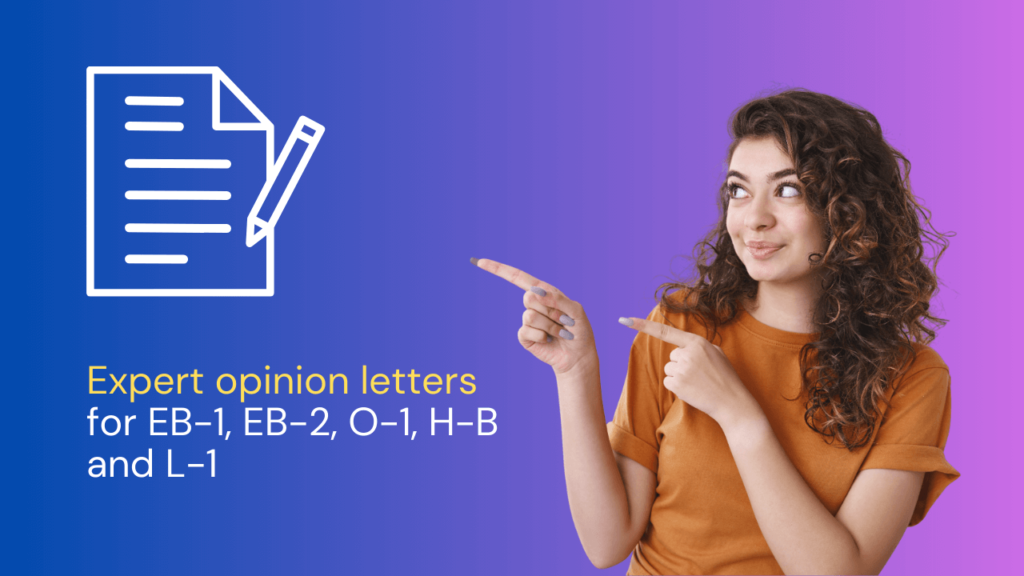Expert Opinion Letter vs. Recommendation Letter: What Immigration Officers Really Look For
Expert opinion letters and recommendation letters can determine U.S. immigration success or failure. The EB-2 NIW (National Interest Waiver) demands compelling documentation. Expert opinion letter submissions are the life-blood of a strong petition. These letters serve as powerful endorsements that verify an applicant’s qualifications and often become the deciding factor in USCIS evaluations.
Many applicants mix up these two document types or fail to recognize their value. USCIS officers look for persuasive objective evidence during petition reviews. Generic praise letters are not enough. A successful EB2 NIW recommendation letters strategy requires 5-7 letters from distinguished independent experts at minimum. The right USCIS recommendation letter is vital since letters from close associates may carry less weight due to bias concerns.
This piece explains key differences between these letter types and what immigration officers want to see in your documentation. You’ll learn the right time to use each type. We’ll show you how many recommendation letters for EB2 NIW you need and help you identify the best writers to strengthen your case, whether you’re submitting your original application or addressing an RFE.
Understanding the Two Letter Types
Immigration petitions need supporting documents to verify an applicant’s qualifications. Expert opinion letters and recommendation letters play vital roles as evidence. Each type has its own unique purpose, structure, and effect on the application process.
What is an Expert Opinion Letter?
An expert opinion letter comes from recognized authorities or professionals who have specialized knowledge in their field. Professional opinion letters work as research documents that show proof of an applicant’s extraordinary ability through their work, experience, and professional background.
These letters include:
- A detailed look at the applicant’s achievements and career path
- Details about the proposed work that shows substantial merit and national importance
- A review of the applicant’s education, skills, knowledge, and track record
- Papers that back up citations or successful projects
- Proof that shows the applicant’s leadership or critical role in their field
At its core, an expert opinion letter gives an unbiased assessment from qualified authorities who can measure an applicant’s qualifications against visa rules. These letters become extra important when USCIS officers don’t know much about specialized fields or foreign credentials.
What is a Recommendation Letter?
A recommendation letter for immigration works as “expert testimony” about an applicant’s abilities. It showcases their character, achievements, and why they’d be a good fit in a new country. Unlike expert opinions, people who know the applicant directly write these letters.
USCIS recommendation letters come in two types:
- “Inner Circle” letters: Peers and colleagues write these based on direct work experience with the applicant
- “Outer Circle” letters: Government officials, agencies, global industry groups, or independent experts with no direct ties to the applicant write these
A good visa recommendation letter has a well-laid-out format. It needs a clear statement about the applicant’s abilities, 2-3 examples of their best qualities, and ends with a specific recommendation level.
Key Differences in Purpose and Structure
The main difference between these documents lies in their purpose and authors. Expert opinion letters give independent, objective reviews from authorities who might not know the applicant personally but can assess their qualifications based on evidence. Recommendation letters, however, usually come from people who have worked directly with the applicant.
The structure of these letters also differs by a lot. An EB2 NIW expert opinion letter looks at how the applicant meets specific visa rules through data, citations, and measurable achievements. A niw recommendation letter focuses on personal qualities, work relationships, and firsthand observations of the applicant’s skills.
USCIS weighs these letters differently. Letters from the “inner circle” offer valuable insights but might get less attention due to possible bias. Expert opinion letters from respected independent experts carry more weight in making decisions.
Visa categories like EB-2 NIW, H-1B, and O-1 need both types of letters. Together, they paint a full picture of the applicant’s qualifications, each serving its own important role in building a strong case.
When and Why Each Letter is Used
Expert opinion letters serve as a vital component in strengthening certain immigration visa applications. Each category needs specific supporting evidence.
Visa Categories That Require Expert Letters (EB-2 NIW, H-1B, O-1A)
Expert opinion letters are a great way to get approval for employment-based visas that need specialized skills:
- EB-2 NIW (National Interest Waiver): These letters verify the applicant’s advanced degree or exceptional ability through an unbiased review of work experience. They prove why the applicant should continue their work and explain the logic behind waiving the job offer requirement.
- H-1B Visa: Expert opinion letters help address specialty occupation qualification and beneficiary qualification challenges during original petitions or RFEs. They verify both job requirements and the beneficiary’s qualifications.
- O-1A Visa: Applicants need to show extraordinary ability through “sustained national or international acclaim.” Professional opinion letters show that the applicant belongs to the small percentage at the very top of their field.
Use Cases: Initial Petition vs. RFE Response
Initial Petition Submission: An expert opinion letter boosts approval chances by addressing potential concerns upfront. Most professionals suggest ordering these letters only when necessary at this stage.
RFE Response: Expert letters become essential when USCIS issues a Request for Evidence. The letter can target specific gaps or concerns that USCIS identified. Position analysis letters confirm that a job meets the Specialty Occupation criteria under USCIS guidelines.
Examples of Expert Opinion in Real Applications
EB-2 NIW cases need letters that show how the applicant’s work benefits the nation. These letters highlight unique skills, expertise, or resources that help the applicant drive meaningful progress. The letters should include the applicant’s degree, technical certificates, work importance examples, and a summary of key contributions.
H-1B petitions benefit from combination letters that merge position analysis and beneficiary qualifications into one document. These detailed evaluations make the petition more efficient by putting all relevant information in one place.
O-1A applications require letters that showcase the applicant’s achievements and help USCIS adjudicators understand their work’s significance. These letters must emphasize how achievements qualify as “outstanding” and of “international acclaim” that set the applicant apart in their field.
What USCIS Looks for in Each Letter Type
USCIS inspects supporting documentation with close attention to detail. You can improve your chances of approval if you know what immigration officers look for in expert opinion letters and recommendation letters.
USCIS Letter of Recommendation Requirements
USCIS needs more than generic praise for recommendation letters for EB2 NIW and other visa categories. The focus should be on objective evidence of past achievements rather than future potential promises. A strong USCIS recommendation letter must:
- Provide specific, quantifiable examples of the applicant’s accomplishments
- Explain clearly how the applicant has influenced their field
- Use simple language so non-experts can understand complex achievements
- Include technical details regarding the applicant’s contributions
- Highlight international or national recognition earned by the applicant
Immigration officers take letter authorship seriously. They verify that recommenders actually wrote their letters by checking for inconsistent phrases, formatting, or suspiciously similar content across multiple letters. Yes, it is common for USCIS to dismiss all letters as not credible when they seem template-based rather than individually crafted.
How USCIS Reviews Expert Opinion Letters
The author’s credentials and letter content both matter when USCIS reviews an expert opinion letter. Notable researchers from prestigious institutions like Johns Hopkins can overcome potential bias concerns through their reputation.
USCIS then checks if the professional opinion letter shows how the applicant meets specific visa criteria. For EB-2 NIW petitions, this means addressing all three prongs of the Matter of Dhanasar test with evidence-based assertions instead of vague claims.
Independent verification carries weight with USCIS. Peer review manuscripts make compelling evidence since they represent unbiased, anonymous evaluations of the author’s work.
Bias Concerns: Inner Circle vs Outer Circle Letters
USCIS makes a clear distinction between two types of endorsements:
“Inner circle” letters come from collaborators, supervisors, or colleagues who have worked directly with the applicant. These letters often contain detailed praise, but USCIS sees them as potentially biased and less persuasive.
“Outer circle” letters from independent experts who know the applicant only through their achievements carry more weight. These experts might know the applicant’s work through publications or industry impact without meeting them personally.
So, immigration lawyers suggest getting most letters from outer circle experts. This approach shows that the applicant’s influence goes beyond their immediate professional circle and provides objective evidence of their exceptional abilities.
How to Write a Strong Letter for Immigration
Writing effective immigration letters demands both accuracy and careful planning. A well-laid-out expert opinion letter can make a dramatic difference in petition outcomes. We focused on presenting relevant credentials and objective evidence.
Expert Credentials: What Matters Most
The author’s credibility forms the cornerstone of a persuasive expert opinion letter. Your expert’s professional background should prove their extensive experience and recognition in the applicant’s field. This background has advanced degrees, professional certifications, and documented contributions through research or notable projects. Your expert’s connection to prestigious institutions improves credibility. Professors at prominent universities or executives at leading companies add substantial weight to their opinions. Research publications, awards, and recognitions make the expert’s authority even stronger.
Objective Evidence: Data, Citations, and Achievements
A winning niw recommendation letter must show verifiable analytics, statistics, and factual data. USCIS reviews petitions based on objective evidence, so your letters should feature:
- Quantifiable achievements with specific metrics
- Citation statistics showing research effect
- Real examples of the applicant’s contributions
Your eb2 niw expert opinion letters need as much objective evidence as possible to support the three prongs of Matter of Dhanasar. USCIS often dismisses claims without such evidence.
Structure of a Case-Winning Letter
A powerful professional opinion letter follows this clear layout:
- Introduction explaining the letter’s scope
- Expert’s qualifications in detail
- Connection with the applicant
- Evidence that proves the expert can review properly
- Detailed analysis showing how the applicant meets visa requirements
Common Mistakes to Avoid in USCIS Letters
Many uscis recommendation letters fail due to simple mistakes. Never leave fields blank—write “N/A” instead. Document inconsistencies often trigger rejections. USCIS reviews every document closely. Mismatched information might look like fraud. Not disclosing relevant information like criminal history can hurt more than the offense itself.
You should get 5-7 letters from distinguished independent experts who can give an objective review of qualifications and achievements to maximize approval chances.
How Many Letters Are Needed and Who Should Write Them
Letters of recommendation and writer qualifications can make or break your immigration petition. A good grasp of these requirements might be the key to getting your petition approved.
How Many Recommendation Letters for EB2 NIW?
Most immigration experts suggest 5-7 recommendation letters for EB2 NIW petitions. This number gives enough proof without watering down their impact. Other visa types need different numbers – O-1 petitions work best with 3-4 letters, while EB1B petitions need just 1-2 letters.
Your best mix should look like this:
- Independent experts: 3-4 letters (60-70% of total)
- Affiliated recommenders: 1-3 letters (30-40% of total)
Quality beats quantity when it comes to these letters. A few powerful, well-written letters work better than many generic ones.
Who Qualifies as an Expert or Recommender?
Expert opinion letter writers come in two main groups:
Your “inner circle” recommenders are direct supervisors, co-workers, or colleagues who know your achievements firsthand. For O-1 visas, faculty support letters from direct supervisors need specific appointment titles, dates, and salary details.
“Outer circle” recommenders are independent experts who have never worked with you directly, and their words carry more weight. These experts should know your work through publications, presentations, or your reputation. Getting recommenders from different institutions and countries helps show your broader influence.
Can You Apply for EB2 NIW Without Recommendation Letters?
Recommendation letters aren’t strictly required for EB2 NIW applications, but very few petitions get approved without them. Applicants who skip letters must make up for it with exceptionally strong evidence elsewhere.
Some immigration firms offer no-letter packages, claiming this might save 1-2 months in processing time. Letters are a great way to get validation that other documents can’t match. Applications without letters must rely on achievements that stand on their own – a tough ask even for candidates with amazing credentials.
Expert Opinion Letter vs. Recommendation Letter:
| Aspect | Expert Opinion Letters | Recommendation Letters |
|---|---|---|
| Main Goal | Provides an independent, objective evaluation of qualifications and achievements | Offers a personal testimony highlighting the applicant’s character and accomplishments |
| Authors | Recognized experts or professionals with subject-matter authority (no personal connection required) | Colleagues, supervisors, or experts who know the applicant personally |
| Content Focus | – In-depth analysis of achievements – Evaluation of skills/education – Citations and evidence – Objective metrics | – Personal traits and professionalism – Firsthand observations – Work relationship context |
| Letter Categories | Independent assessments from external, unaffiliated experts | Letters from internal colleagues and possibly external experts who know the applicant |
| USCIS Weight | Higher weight due to objectivity and expert detachment | Slightly lower weight due to potential bias from close professional ties |
| Recommended Quantity | Typically 1–2 as part of a total set of 5–7 letters for EB-2 NIW | Typically 4–6 as part of the 5–7 letter set (mix of internal and external sources) |
| Key Visa Applications | – EB-2 NIW – H-1B – O-1A | – EB-2 NIW – Other employment-based visa types |
| Structure Requirements | – Author credentials – Evidence-backed analysis – Metrics and citations – Direct visa criteria evaluation | – Clear endorsement statement – 2–3 specific examples – Personal perspective and support |
Conclusion
Immigration officers examine every document submitted with visa petitions in detail. Success depends on knowing the distinct roles of expert opinion letters and recommendation letters. These documents work together—one gives objective assessment from independent authorities, while the other provides firsthand testimony from professional associates.
A smart mix of both letter types builds a strong case for USCIS approval. EB-2 NIW petitions work best with 5-7 high-quality letters. Most should come from “outer circle” experts who give unbiased evaluations. Letters from the “inner circle” help us learn about the candidate, but they carry less weight because of possible bias.
Immigration officers look beyond just the number of letters. They want solid proof of achievements, measurable results, and specific examples that show extraordinary ability. The letters become more convincing when they come from respected professionals at prestigious institutions.
Some applicants try to handle the immigration process without supporting letters, but this rarely works. Even candidates with outstanding credentials need expert validation to show how their achievements matter in their field.
The difference between approval and denial often comes down to these crucial documents. Applicants should focus on getting strong endorsements that target specific visa requirements instead of general praise. Letters from qualified experts remain the life-blood of successful immigration applications, whether you’re answering an RFE or filing your first petition. When credible authorities present objective evidence, it speaks volumes to USCIS adjudicators who make these life-changing decisions.



